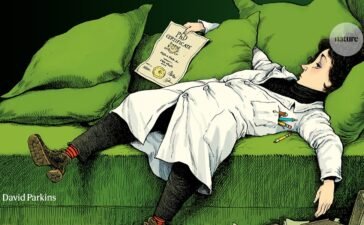
The Matthew effect describes how scientists who win grant funding early in their careers are more likely to have success later on. Credit: malerapaso/Getty
Perseverance is key when it comes to securing science funding, found an analysis of more than 100,000 grant applicants that looked at how early success affects future prospects.
The research shows how the Matthew effect — a phenomenon describing how those with an early advantage or success tend to accumulate more over time — could be driving inequity in academia.
Previous work has suggested that those who win funding early in their career are more successful later down the line. But the latest study, described in a working paper posted on the preprint platform Figshare on 12 June1, is the largest of its kind, and the first to look at trends across different funders and countries. “They’re able to shed a bit more light on the mechanisms” driving the effect, says Thijs Bol, a sociologist at the University of Amsterdam.
The vast data set highlights a ‘barrier’ in research, says Donna Ginther, an economist at the University of Kansas in Lawrence. “Some promising scientists may be discouraged and leave science. This could create a net loss to society in terms of scientific discoveries.”
The rich get richer
The Matthew effect was named after a Biblical parable that describes how “to those who have, more will come”, and is one of the most widely discussed sociological theories in research. It was first proposed by sociologist Robert Merton in the late 1960s, and has been observed in science funding before.
In 2018, a landmark paper co-authored by Bol was the first to use funding data to show that junior researchers in the Netherlands who narrowly secured an early-career grant from the national funder later outperformed those who just missed out, and were 50% more likely to become a professor — despite the two groups having similar publication and citation records when they first applied.
To see whether the pattern persists more broadly, Vincent Traag, a computational social scientist at Leiden University in the Netherlands, and his colleagues expanded on this experiment with data on more than 100,000 grant applications to 14 different funding programmes in Canada, Luxembourg, the United Kingdom and Austria.
They found that across all funders, 26% of successful applicants for awards later on in their careers had previously secured early-career awards, compared with 15% who hadn’t. “This is a major expansion of the work,” says Bol. Not only does the latest study find the effect exists at many more funders in different countries, he adds, but it also holds true for researchers who scored across the spectrum on grant applications — not just those who narrowly secured funding.
Mathematical modelling suggested that the difference was caused by those who had early grant success applying more often for future grants than those who did not secure early funding, rather than any bias by grant reviewers favouring researchers who had won previous money.
The setback effect
The results suggest that funders should consider other ways to allocate funding, Traag says. “A higher funding rate for promising but previously unsuccessful applicants may be more effective than providing even more funding to those who already secured funding.”
You Might Also Like
The Nature Podcast highlights of 2025
You have full access to this article via your institution. Download the Nature Podcast 24 December 2025In this episode:00:40 What...
Seeding opportunities for Black atmospheric scientists
Vernon Morris (outlined) with alumni from the atmospheric sciences PhD programme he established at Howard University in Washington DC.Credit: Vernon...
peer reviews created using AI can avoid detection
The difficulty of detecting AI-tool use in peer review is proving problematic.Credit: BrianAJackson/iStock via GettyIt’s almost impossible to know whether...
I’ve earned my PhD — what now?
Illustration: David ParkinsThe problemDear Nature,In December 2024, I finished my PhD in biomedical chemistry in Italy, and I now find...










